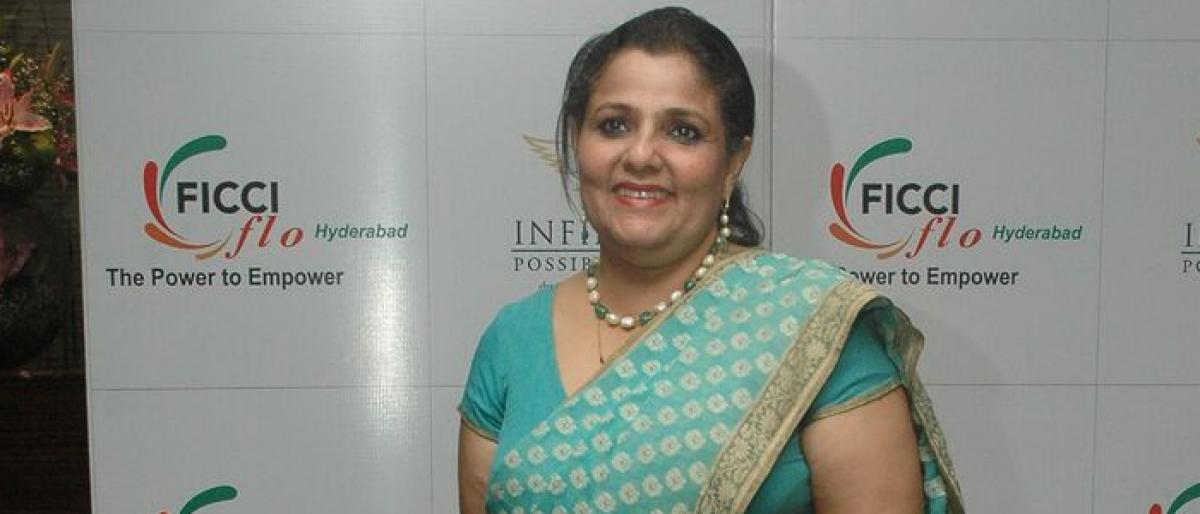Live
- Income tax refunds jump 46.3 pc to Rs 3.04 lakh crore in April-Nov
- Financial Intelligence Unit detects undisclosed income worth Rs 11,000 crore in 2024: Centre
- Odisha BJP chief to be elected in January
- AP Home Minister Anitha alerts officials amid rains in heavy Rains in Tirupati
- Taluk Guarantee panel
- Uber Launches Uber Moto Women for Safer and Flexible Rides in Bengaluru
- ‘Fear’ pre-release event creates waves
- Champions Trophy 2025 Host Change? Indian Broadcaster's Promo Sparks Controversy
- Nabha Natesh introduced as Sundara Valli from ‘Swayambhu’
- Aamir Khan praises Upendra's ‘UI: The Movie’ ahead of its release
Just In

Anna Chandy, countrys first supervising and training transactional analyst and Chairperson of Deepika Padukones The Live Love Laugh Foundation, which focuses on the cause of mental health in India, was in Hyderabad to attend an event Impact of Silence Psychological Abuse conducted by FICCIFLO
Anna Chandy, country's first supervising and training transactional analyst and Chairperson of Deepika Padukone’s ‘The Live Love Laugh Foundation’, which focuses on the cause of mental health in India, was in Hyderabad to attend an event ‘Impact of Silence – Psychological Abuse’ conducted by FICCI-FLO.
Excerpts from an interview:
Tell us about ‘The Live Love Laugh Foundation’?
Deepika Padukone started the Foundation about three years ago after her recovery from depression. The Live Love Laugh Foundation focuses on depression, anxiety and stress-related disorders. The main area of interest is to share the conversation in such a way that mental health becomes a living room subject and there is no stigma associated to it so people who have mental illness are included in mainstream society.
India is ranked one amongst the highest number of depressed people, what is your take on this?
We are a population of 1.3 billion people, which leads to factors that cause stress. Currently, we have issues related to migration – people moving from rural to urban areas. Another social issue is the number of women working.
In a workplace, about 40 per cent women are part of the workforce, which is again a social issue because culturally we have a stereotypical idea that a woman’s place is at home, so from a caretaker, she is becoming a professional. Breakdown of a joint family system to a nuclear family system is an issue again. I also think that in a way we are so technology-driven now which brings its own set of issues. The way we look at life in terms of time, we believe that time is much more infinite whereas now when we follow the Western philosophy, time is very limited and that impacts us.
How to cope with depression?
It is not very difficult. Depression occurs in three stages – mild, moderate and severe. When you have mild to moderate depression you can actually recover much quicker than when it becomes severe. The reason why people go to the end of the spectrum, which is severe because it was not addressed in the earlier stages. The earlier we address it, the quicker the recovery is. I think it is ok to actively seek help. There is a light at the end of the tunnel and it is ok to speak up and not to feel ashamed.
Do you have plans to reach out to schools?
Yes, our foundation has a programme called ‘You Are Not Alone’. We conduct the programme in six languages in six states, which includes Hyderabad too. It is divided into two segments, in the first phase we address the problems of adolescence children and in the other, we train teachers to recognise depressed students in school.
Many schools do not pay attention to students in depression and victims of bullying. What is your take on it?
The impact of bullying on a child is far more severe than we actually acknowledge and therefore schools need to be actively involved in discouraging bullying and increase awareness. Not just punitive measures like punishing. Schools need to engage more in preventive awareness or life skills programmes in their curriculum.

© 2024 Hyderabad Media House Limited/The Hans India. All rights reserved. Powered by hocalwire.com







